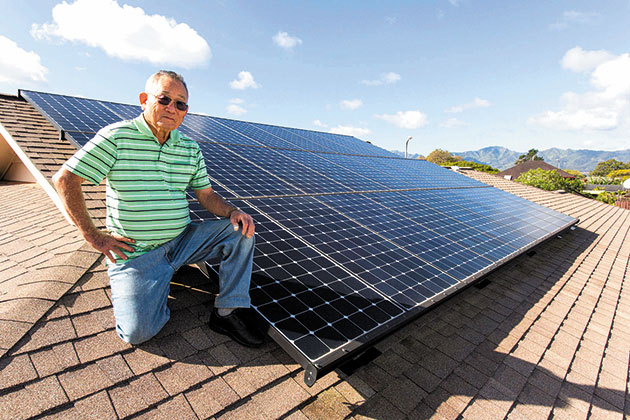Securing you a place on the grid
For most homeowners, a solar project is one of the best investments they can make, even with the recent news that HECO may require homeowners who live in neighborhoods that have high levels of PV installations to undergo a study before approving their PV projects. The study would determine if any additional equipment is necessary to connect their PV project to that particular part of the electricity grid.
While there are a number of areas that have reached high levels of saturation, there are many more that have not. This means it is more important than ever to move forward with a solar project now to ensure there won’t be additional delays or costs to connect the project to the electric grid. RevoluSun has proven experience working with utilities where grid space is an issue, like their operations on the Big Island.
Since 2012, about 70 percent of RevoluSun’s Big Island customers were required to undergo a supplemental review process. RevoluSun Big Island general manager Nick Huntz reports a majority of customers get solar installed in a timely manner, even with the review process. “Overall, the supplemental review can make a PV installation process take four to six months rather than the traditional two to three months,” he described, adding that he usually sees the study results from the utility within 20 to 30 days.

“We have the experience to work with the utility and surmount any obstacles, but it’s important that homeowners get their applications in now so they have their place in line,” he said. HECO maintains a queue for net metering interconnection applications, and the earlier a customer files an application, the better the chance of interconnection without lengthy delay or expense.
“There is no cost for the supplemental study, despite misleading media stories,” Huntz clarified. “If the utility determines a supplemental study is needed, that is reviewed at no cost. What people do have to pay for is the upgrade to the circuit in their area if the study determines that is needed.”
Even with the new restrictions, the average solar project will still save homeowners tens of thousands of dollars over its lifetime, and even if an extra fee is assessed, the system will still pay for itself within three to five years. “We’re in this together,” said Huntz. “We have the experience and the team to help customers through this process to achieve the solar independence they desire and deserve.”
As Hawaii’s leading provider of residential and commercial solar systems, RevoluSun is holding free educational sessions addressing how to manage the new solar project application process. The neighborhood solar Q&A roundtables will be held on Oahu multiple times per month. View the schedule at www.revolusun.com/events.
REVOLUSUN
contact // 748-8888
web // www.RevoluSun.com